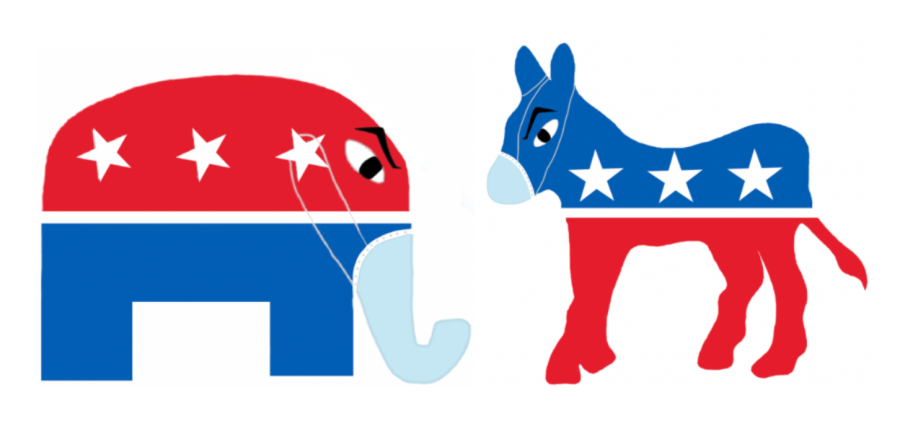Liberty, justice and masks for all
Graphic illustration by Sruthi Medepalli
Democratic donkey and Republic elephant staring angrily at each other with masks on.
October 7, 2020
Originally mandated to slow the spread of the COVID-19 pandemic, masks have become a topic of political debate. Like many other issues, Americans have unnecessarily mixed politics with general welfare and health.
The Constitution itself is based on values of liberty and freedom, values which some groups feel masks infringe upon. But as American citizens, it is also our responsibility to band together and help one another stay safe in such trying times. Amid a pandemic in which hundreds of thousands of American lives have been lost, political views should be disregarded in order to focus our attention on the urgent task at hand — reducing the spread of the virus.
Historically speaking, there has rarely been common ground between Democrats and Republicans. Generally, the Democratic party values progressiveness whereas the Republican party values traditionalism. These ideologies often play into how people of different political parties perceive their right to liberty.
Current-day interpretation of liberty comes in the form of petty political vendettas that stunt real growth and improvement. Although politics do play a large role in our daily lives, it’s important to distinguish between political issues and healthcare issues.
A mask is simply a covering one wears over their nose and mouth to prevent the spread of COVID-19. They block respiratory particles formed by sneezing, coughing and talking from becoming airborne and going into another person’s body, a method called source control. Masks also come in a variety of styles and shapes, so individuals can try different mask formats before deciding how much of an inconvenience they are. Emerging evidence from the U.S. Centers for Disease Control and Prevention (CDC) reveals that after mask mandates were put into place, the daily growth rate for the virus dramatically decreased.
Some Americans have misinterpreted mask-wearing as another crusade against their rights. On July 18, hundreds of anti-maskers, some armed, crowded outside the Ohio statehouse with signs that read things like, “My body, my choice” and “Is it about the virus? Or is it about control.” These arguments demonstrate the seemingly ignorant and shallow cause they feel so strongly about. Protesting is an honored American right, but protesting a healthcare mandate in order to prevent thousands of people from dying is an illogical use of this right. At the time of the protest, in Ohio alone, there were more than 17,000 cases, and healthcare officials were urging citizens to wear their masks to protect themselves and those around them.
Disproving the many struggles that anti-maskers have detailed, students at Lynbrook High School have seemed to implement masks into their daily life with little to no difficulty. Even students with legitimate concerns for their breathing while wearing a mask have done their best to flatten the curve and protect others.
“I am a candidate for asthma so it can get hard to breathe while wearing masks,” sophomore Sadhvi Narayanan said. “But I have to put the safety of myself and others over that.”
The Trump administration has played a role in supporting the politicization of masks. During an April press conference, President Donald Trump announced the CDC’s new guidelines to wear masks and social distance in public, but ironically, he expressed strong distaste toward them.
“I don’t think I’m going to be doing it.” Trump said, “Wearing a face mask as I greet presidents, prime ministers, dictators, kings, queens — I just don’t see it.”
As the leader of America, Trump’s decisions and personal opinions significantly influence the actions of many Americans. An ABC News survey from July showed that 86 percent of Democrats, 71 percent of independents and less than 48 percent of Republicans wear masks when they go out — statistics that blatantly exemplify the effect of Trump’s decision to not wear a mask. His repeated conflict with mask-wearing has led his Republican supporters to question the efficacy of masks and even encouraged them to ignore the CDC’s recommendations backed up by proven studies.
Fueled by the mindset of rugged individualism, many Americans refuse to wear masks because they don’t feel responsible for the health and safety of others, their personal comfort matters more.
Furthermore, the Trump administration has also shamed presidential candidate Joe Biden and other members of the opposing party for following the health mandate.
“But did you ever see a man that likes a mask as much as him,” Trump said in an effort to mock Biden during a campaign rally. “I’d say, this guy’s got some big issues. Hanging down.”
Their main purpose being to reduce transmission, the common surgical and cloth masks prevent coronavirus from passing to others rather than guard COVID-19 from entering your body. But in this country, the feeling seems to be that the ideal citizen is one who does what is best for themselves rather than trying to help others. A World Health Organization study shows that wearing a mask can slow the spread of COVID-19 by 85 percent. This piece of fabric is nothing more than an incredibly easy way to flatten the curve of a virus that is killing thousands. It’s not a symbol for freedom or a method of imprisonment, but a simple barrier against COVID-19.




























































